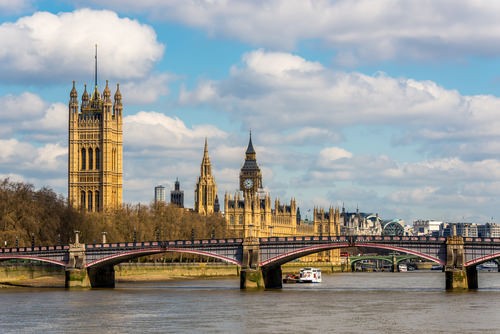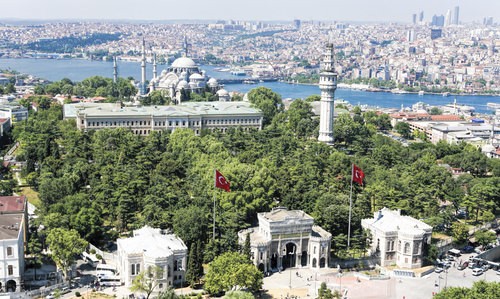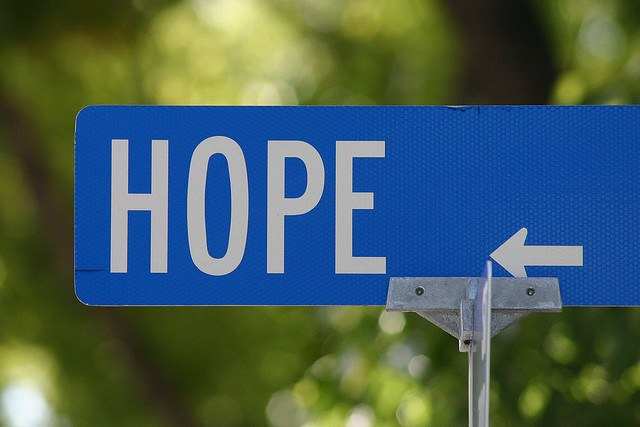The Tree of 40 Fruit Is Exactly as Awesome as It Sounds
Artist Sam Van Aken discusses his thought-provoking project and its place at the intersection of farming, sculpture, and preservation

Award-winning contemporary artist and Syracuse University art professor Sam Van Aken grew up on a family farm in Reading, Pennsylvania, but he spent his college years and much of his early career focused on art rather than agriculture. While Van Aken says that his work has always been "inspired by nature and our relationship to nature," it wasn't until recently that the artist's farming background became such a clear and significant influence, first in 2008 when he grafted vegetables together to create strange plants for his Eden exhibition, and then shortly after that when he started to work on the hybridized fruit trees that would become the Tree of 40 Fruit.
Each tree begins as a slightly odd-looking specimen resembling some kind of science experiment, and for much of the year, looks like just any other tree. In spring, the trees bloom to reveal an incredibly striking and thought-provoking example of what can happen when nature inspires art. Then, over the course of several months, Van Aken's trees produce an incredible harvest of plums, peaches, apricots, nectarines, and almonds, including many you've likely never seen before.
Thus far, Van Aken has created and placed 16 trees in museums, community centers, and private art collections around the country, including in Newton, Massachusetts; Pound Ridge, New York; Short Hills, New Jersey; Bentonville, Arkansas; and San Jose, California. Using a unique process he calls "sculpture through grafting," Van Aken creates trees that grow and support more than 40 varieties of stone fruit, including many heirloom, antique, and native varieties.
On the heels of Van Aken's TEDxManhattan talk, we spoke with him about the Tree of 40 Fruit, how he developed and executed the concept, his plans for the future, and what happens to all that fruit.
Epicurious: What is the Tree of 40 Fruit and what inspired the project?
Sam Van Aken: At the time this project began I was doing a series of radio hoaxes where I hijacked commercial radio station frequencies and played my own commercials and songs. In addition to becoming acquainted with FCC regulations I also discovered that the term "hoax" comes from "hocus pocus," which in turn comes from the Latin "hoc est enim corpus miem," meaning "this is my body" and it's what the Catholic priest says over the bread during [the] Eucharist, transforming it into the body of Christ. This process is known as transubstantiation and [it] led me to wonder how I could transubstantiate a thing. How could the appearance of a thing remain the same while the reality changed? And so, I transubstantiated a fruit tree. Through the majority of the year it is a normal-looking fruit tree until spring when it blossoms in different tones [of] pink, white, and crimson, and late in summer it bears [more than] 40 different types of fruit.
Epi: What is the goal of the Tree of 40 Fruit and what do you hope to communicate?
SVA: First and foremost I see the tree as an artwork. Like the hoaxes I was doing, I want the tree to interrupt and transform the everyday. When the tree unexpectedly blossoms in different colors, or you see these different types of fruit hanging from its branches, it not only changes the way you look at it, but it changes the way you perceive [things] in general.
As the project evolved, it took on more goals. In trying to find different varieties of stone fruit to create the Tree of 40 Fruit, I realized that for various reasons, including industrialization and the creation of enormous monocultures, we are losing diversity in food production and that heirloom, antique, and native varieties that were less commercially viable were disappearing. I saw this as an opportunity to, in some way, preserve these varieties. In addition to maintaining these varieties in my nursery, I graft them to the Tree of 40 Fruit. Additionally, when I place a Tree of 40 Fruit, I go to local farmers and growers to collect stone fruit varieties and graft them to the trees. In this way they become an archive of the agricultural history of where they are located as well as a means to preserve antique and native varieties.
Epi: You've described your artistic process as "sculpting by way of grafting." Could you explain what that means?
SVA: I currently work with over 250 varieties of stone fruit and developed a timeline of when they blossom in relationship to each other. By grafting these different varieties onto the tree in a certain order I can essentially sculpt how the tree is to blossom.
Epi: Why did you choose to work with stone fruits?
SVA: Stone fruits have [a] greater diversity among the species, and are the most inter-compatible. Although it gets tricky when you start to graft cherries, for the most part one can easily graft between plums, peaches, apricots, nectarines, and even almonds.
Epi: Where and how did you acquire all the different fruit varieties?
SVA: My primary source for most of these varieties was the New York State Agricultural Experiment Station in Geneva, New York. When I began the project there was an orchard at the Experiment Station with hundreds of different plum and apricot varieties. They planned to tear this orchard out, so I picked up the lease until I could graft all of these varieties onto the trees in my nursery.
Epi: How long does it take to create one of your trees?
SVA: Depending on when the tree is planted it takes about five years to develop each tree and graft 40 varieties to it.
Epi: Do you continue to work on the trees after they're planted?
SVA: After the tree has been planted, I visit it twice a year, in the spring to prune and [in] late summer to graft, for three years, until the tree is established.
Epi: What happens to all the fruit from your trees?
SVA: Until I discovered garlic and peppermint repellents, they were a huge hit with the local deer, but fortunately we've resolved that. I've been told by people that have [a tree] at their home that it provides the perfect amount and perfect variety of fruit. So rather than having one variety that produces more than you know what to do with, it provides good amounts of each of the 40 varieties. Since all of these fruit ripen at different times, from July through October, you also aren't inundated.
Personally, I give away most of the fruit that comes from my trees. For people who aren't aware of farming and growing, the diversity of these varieties and their characteristic tastes are surprising and they ultimately begin to question why there are only a few types of plums, one type of apricot, and a handful of peach varieties at their local market.
Epi: Each of your trees has the capacity to grow more than 40 different varieties of stone fruits. Can you explain the significance of the number 40?
SVA: The number 40 has been used throughout Western religion to represent a number beyond counting. [Being] interested in this idea of a bounty of fruit coming from one tree, 40 seemed appropriate.
Epi: Do you have any plans for the future of this project?
SVA: I would like to continue to place these trees throughout the country preserving these heirloom, antique, and native fruit varieties. Wherever I place them there is a sense of wonderment that they create through their blossoms, the different fruit, and the process by which they are created.
Eventually, I would like to create a grove or small orchard of these trees in an urban setting. I have always stayed away from artwork that educates people, but to some extent these works in addition to being beautiful and producing fruit cause one to reconsider the possibilities with food and fruit production.
Photo: Sam Van Aken
See More Interviews:
| This tree produces 40 different types of fruit |
| BECKY CREW |
| MONDAY, 21 JULY 2014 |
|
Award-winning artist Sam Van Aken has grown a hybridised fruit tree that produces 40 different varieties of stone fruit each year.

An art professor from Syracuse University in the US, Van Aken grew up on a family farm before pursuing a career as an artist, and has combined his knowledge of the two to develop his incredible Tree of 40 Fruit.
In 2008, Van Aken learned that an orchard at the New York State Agricultural Experiment Station was about to be shut down due to a lack of funding. This single orchard grew a great number of heirloom, antique, and native varieties of stone fruit, and some of these were 150 to 200 years old. To lose this orchard would render many of these rare and old varieties of fruit extinct, so to preserve them, Van Aken bought the orchard, and spent the following years figuring out how tograft parts of the trees onto a single fruit tree.
Working with a pool of over 250 varieties of stone fruit, Van Aken developed a timeline of when each of them blossom in relationship to each other and started grafting a few onto a working tree’s root structure. Once the working tree was about two years old, Van Aken used a technique called chip grafting to add more varieties on as separate branches. This technique involves taking a sliver off a fruit tree that includes the bud, and inserting that into an incision in the working tree. It's then taped into place, and left to sit and heal over winter. If all goes well, the branch will be pruned back to encourage it to grow as a normal branch on the working tree.
After about five years and several grafted branches, Van Aken's first Tree of 40 Fruit was complete.
Aken’s Tree of 40 Fruit looks like a normal tree for most of the year, but in spring it reveals a stunning patchwork of pink, white, red and purple blossoms, which turn into an array of plums, peaches, apricots, nectarines, cherries and almonds during the summer months, all of which are rare and unique varieties.
Not only is it a beautiful specimen, but it’s also helping to preserve the diversity of the world’s stone fruit. Stone fruits are selected for commercial growing based first and foremost on how long they keep, then how large they grow, then how they look, and lastly how they taste. This means that there are thousands of stone fruit varieties in the world, but only a very select few are considered commercially viable, even if they aren't the best tasting, or most nutritious ones.
Van Aken has grown 16 Trees of 40 Fruit so far, and they’ve been planted in museums, community centres, and private art collections around the US. He now plans to grow a small orchard of these trees in a city setting.
Of course, the obvious question that remains is what happens to all the fruit that gets harvested from these trees? Van Aken told Lauren Salkeld at Epicurious:
"I've been told by people that have [a tree] at their home that it provides the perfect amount and perfect variety of fruit. So rather than having one variety that produces more than you know what to do with, it provides good amounts of each of the 40 varieties. Since all of these fruit ripen at different times, from July through October, you also aren't inundated."
|

Borno commences psycho-treatment for Boko Haram victims
Borno State Government has launched a psycho-social treatment to help victims of Boko Haram attacks in 12 local government areas in the state to overcome their trauma and mental challenges.
Speaking at a sensitisation workshop organised by the state Ministry of Women Affairs and Social Development at the weekend in Maiduguri, the state Commissioner for Women Affairs, Hajiya Galadima, said the psycho-treatment services would be provided to vulnerable groups, mostly women, children and physically challenged persons in the 12 selected local government areas.
She said her ministry was undertaking the exercise for Boko Haram victims in conjunction with the United Nations Children’s Fund (UNICEF), human rights organisations, National Emergency Management Agency (NEMA) and other stakeholders.
The local governments selected for the exercise are Bama, Biu, Konduga, Kaga, Maiduguri Metropolitan Council, Gwoza, Damboa, Chibok, Mafa, Ngala, Hawul and Jare.
She said the areas were carefully selected because they were the worst affected by the over three years insurgency.
“We believe that they have suffered the adverse experiences of emergency situation more than the remaining local government areas of the state,” the commissioner stated.
She commended UNICEF for what she described as its prompt attention in the area of trauma and support through the psycho-social support and protection services in the selected local government areas.
The Commissioner for Local Government and Chieftaincy Affairs, Alhaji Baba Garbai, in his message, noted that women and girls suffered more during Boko Haram attacks, saying many of them were often forcefully taken as sex slaves and servants by their abductors.
The United Nations Children’s Fund representative in Nigeria, Dr. Alfred Mutiti, said the fund had trained 55 volunteer workers in psycho-social support and protection to be deployed to the 27 communities of the 12 selected local government areas to carry out the psycho-social services to the victims of the insurgency.
Alfred said displaced persons, especially women and children needed the psycho-social support services to rebuild their traumatised lives. He said the Boko Haram insurgency had led to the destruction of social institutions responsible for the development of children.
She said her ministry was undertaking the exercise for Boko Haram victims in conjunction with the United Nations Children’s Fund (UNICEF), human rights organisations, National Emergency Management Agency (NEMA) and other stakeholders.
The local governments selected for the exercise are Bama, Biu, Konduga, Kaga, Maiduguri Metropolitan Council, Gwoza, Damboa, Chibok, Mafa, Ngala, Hawul and Jare.
She said the areas were carefully selected because they were the worst affected by the over three years insurgency.
“We believe that they have suffered the adverse experiences of emergency situation more than the remaining local government areas of the state,” the commissioner stated.
She commended UNICEF for what she described as its prompt attention in the area of trauma and support through the psycho-social support and protection services in the selected local government areas.
The Commissioner for Local Government and Chieftaincy Affairs, Alhaji Baba Garbai, in his message, noted that women and girls suffered more during Boko Haram attacks, saying many of them were often forcefully taken as sex slaves and servants by their abductors.
The United Nations Children’s Fund representative in Nigeria, Dr. Alfred Mutiti, said the fund had trained 55 volunteer workers in psycho-social support and protection to be deployed to the 27 communities of the 12 selected local government areas to carry out the psycho-social services to the victims of the insurgency.
Alfred said displaced persons, especially women and children needed the psycho-social support services to rebuild their traumatised lives. He said the Boko Haram insurgency had led to the destruction of social institutions responsible for the development of children.
Vanguard Newspaper: Innoson to roll out N1.5m cars
By Tony Edike
ENUGU—Low and middle class Nigerians desiring to own brand new cars will soon realise their dreams as indigenous automobile manufacturing firm, Innoson Group of Companies, is set to launch its new products.
The firm, which manufactures cars, buses, tankers and other products, would from August 8 introduce brand new cars into the Nigerian automobile market at the cost of N1.5 million.
Chairman and Chief Executive of the company, Mr. Innocent Chukwuma, who announced this in Enugu yesterday, said the cars which would be fully air conditioned and come with other gadgets were made for Nigerians to have access to brand new cars.
The costliest of the coming cars, according to him, would be bought at N3.5 million.
Chukwuma, who spoke at the road show organised by Empower Nigeria at the Enugu campus of the University of Nigeria, Nsukka, told the students of the university how he started venturing into diversified enterprise.
He said: “I will launch my own cars in about two weeks time. And the cars will cost between N1.5 million and N3.5 million, depending on the cadre.”
The Innoson Group Chairman told the audience that his company was not into car assembly but actual car manufacturing.
Chukwuma said: “Some people think that my factory is an assembly plant, but they are wrong. We do not assemble, we manufacture.
“Eighty percent of Nigerians do not believe that we manufacture vehicles in my company. But we do manufacture.
“The raw materials are bought from different countries and some in Nigeria.”
Chukwuma said his workforce has hit over 7,500, expressing happiness that he had contributed immensely to the nation’s economy.
The founder of Empower Nigeria and President of Anabel Group, Nicholas Okoye expressed delight that such a successful entrepreneur like Chukwuma was able to honour the invitation to speak to the youths, regarded as the leaders of tomorrow.
- See more at: http://www.vanguardngr.com/2014/07/innoson-roll-n1-5m-cars/#sthash.E3zWGaT9.dpuf
By Tony Edike
ENUGU—Low and middle class Nigerians desiring to own brand new cars will soon realise their dreams as indigenous automobile manufacturing firm, Innoson Group of Companies, is set to launch its new products.
The firm, which manufactures cars, buses, tankers and other products, would from August 8 introduce brand new cars into the Nigerian automobile market at the cost of N1.5 million.
Chairman and Chief Executive of the company, Mr. Innocent Chukwuma, who announced this in Enugu yesterday, said the cars which would be fully air conditioned and come with other gadgets were made for Nigerians to have access to brand new cars.
The costliest of the coming cars, according to him, would be bought at N3.5 million.
Chukwuma, who spoke at the road show organised by Empower Nigeria at the Enugu campus of the University of Nigeria, Nsukka, told the students of the university how he started venturing into diversified enterprise.
He said: “I will launch my own cars in about two weeks time. And the cars will cost between N1.5 million and N3.5 million, depending on the cadre.”
The Innoson Group Chairman told the audience that his company was not into car assembly but actual car manufacturing.
Chukwuma said: “Some people think that my factory is an assembly plant, but they are wrong. We do not assemble, we manufacture.
“Eighty percent of Nigerians do not believe that we manufacture vehicles in my company. But we do manufacture.
“The raw materials are bought from different countries and some in Nigeria.”
Chukwuma said his workforce has hit over 7,500, expressing happiness that he had contributed immensely to the nation’s economy.
The founder of Empower Nigeria and President of Anabel Group, Nicholas Okoye expressed delight that such a successful entrepreneur like Chukwuma was able to honour the invitation to speak to the youths, regarded as the leaders of tomorrow.
India’s ‘Plastic Man’ Turns Litter Into Paved Roads

A professor of chemistry in Madurai, India believes the mounds of trash lining the roads and fields to be a “wonderful resource” for his country.
The innovator created a method for building roads by transforming common plastic litter—not only thicker acrylics and bottles but also grocery bags and wrappers—into a substitute for bitumen in asphalt.
Rajagopalan Vasudevan’s become known as Plastic Man and travels throughout India instructing engineers how to apply it. To date, more than 5,000 kilometers (3,000 miles) of plastic roads have been laid in at least 11 states.

A professor of chemistry in Madurai, India believes the mounds of trash lining the roads and fields to be a “wonderful resource” for his country.
Instagram Reunites 2 Sisters Who Haven’t Seen Each Other for 18 Years
Published April 2014. | Written by Theresa Leschmann

Two sisters are reunited after 18 because of post on Instagram.
Modern technology has been behind some of the most amazing stories of this century. This one comes from social media site, Instagram.
Nia Edwards, 23, had been out of touch with her 42 year old sister Brenda for roughly 18 years. After trying to find her through social networks Facebook and MySpace, Nia turned to Instagram, a photo sharing site. The two were reconnected about 2 weeks ago.
Nia found Brenda’s page and left a comment explaining who she was, asking if Brenda was indeed Brenda Edwards, the daughter of Milton Edwards and told her sister she hadn’t seen her since she was 4 or 5 but loved her very much.
Brenda responded that she was the right ‘Brenda Edwards’ and that she, too, had been looking for her sister. She asked if Nia had a phone.
Because of the social media hook up, not only were the 2 sisters reunited but Nia is going to get to meet an older brother she has never met before, Milton. He is planning a trip to visit Nia in Hazlehurst, Miss. over the summer.
Nia is excited because even though the 2 women barely know each other, it feels as if they’ve known each other their whole lives. The younger sibling is also hoping to reconnect with 2 other siblings, Maurice and Candace. In the meantime, they are keeping in touch via Instagram by commenting on each other’s photos.
Published April 2014. | Written by Theresa Leschmann

Two sisters are reunited after 18 because of post on Instagram.
Nia Edwards, 23, had been out of touch with her 42 year old sister Brenda for roughly 18 years. After trying to find her through social networks Facebook and MySpace, Nia turned to Instagram, a photo sharing site. The two were reconnected about 2 weeks ago.
Nia found Brenda’s page and left a comment explaining who she was, asking if Brenda was indeed Brenda Edwards, the daughter of Milton Edwards and told her sister she hadn’t seen her since she was 4 or 5 but loved her very much.
Brenda responded that she was the right ‘Brenda Edwards’ and that she, too, had been looking for her sister. She asked if Nia had a phone.
Because of the social media hook up, not only were the 2 sisters reunited but Nia is going to get to meet an older brother she has never met before, Milton. He is planning a trip to visit Nia in Hazlehurst, Miss. over the summer.
Nia is excited because even though the 2 women barely know each other, it feels as if they’ve known each other their whole lives. The younger sibling is also hoping to reconnect with 2 other siblings, Maurice and Candace. In the meantime, they are keeping in touch via Instagram by commenting on each other’s photos.
Man in Disguise Gives $128,000 to Buy Terminal Woman Hope for Cure
A 48-year-old single mother of four in Canada has been struggling for ten years with systemic scleroderma, a disorder that was slowly killing her. Doctors said she’d likely die within a year.
Her only hope was to travel to Chicago for an innovative stem cell transplant treatment by a pioneering U.S. doctor. The process would give her an 80 percent chance for a cure, but it costs $125,000 (US).
She and her family started raising funds two months ago, but had collected just $13,000.
Then, on July 3, everything changed when a man in sunglasses and hat came to the house to give her a donation. He quickly handed her an envelope and left.
Inside was a bank draft for $128,000.
(READ the story from the Ottawa Citizen - Photo by Michael Toy via CC license – Story tip: Mike Chartrand
10 World’s Most Visited Countries Julia Melko
Have you ever wondered what the most visited countries are? Every year, the World Tourism Organization compiles the list of world’s most popular countries according to the number of international tourist arrivals for each country. Check out the list of 10 most visited countries in the world and choose which country you want to visit right now!
Here they are.

1. France (76.8 million visitors)

A country of historical diversity, elegance, and fine wines, France is one of the world’s most visited countries! Embrace a sunshine paradise on the French Riviera, enjoy high-brand Parisian fashion and try the highly delicious wines of the vineyards. Relax on Brittany’s beaches, wander lovely lavender fields in Provence, and enjoy a relaxing cruise through picturesque countryside. France has a lot of things to see and to do!
2. USA (59.7 million visitors)

Being the center of the Western world, the United States of America has something to offer for everyone. From the warm nights of Los Angeles to Broadway shows and the high-rise skyscrapers of New York City, crossing from West to East is like coming to another country. In fact, millions of people enjoy a road trip across the USA. Being among the world’s most popular countries for tourists, the USA has plenty of interesting things to see and to do – from a Florida theme park to a beautiful beach on the Gulf of Mexico, from the vast wonderment of the Grand Canyon to exploring the history of the nation in Boston.
3. China (55.7 million visitors)

One of the top countries to visit, China leads the world in investment in tourism and it’s really paying off! Despite its authoritarian government, the country boasts a history dating back to the first century. There is really nothing like traversing the futuristic streets of Shanghai or walking along the Great Wall. And with its fascinating festivals and culture and awesome natural attractions, China is definitely worth a visit.
4. Spain (52.7 million visitors)

Spain is one of the most beautiful countries in the world! The impressive Moorish architecture of Granada and Seville welcome thousands of tourists every year. Learn a rich sporting history in FC Barcelona and Real Madrid and explore the food culture of the country. Look to the Canary and Balearic Islands and you will experience some of the world’s wildest parties. Also make sure to visit unique Spanish cultural festivals such as the Running of the Bulls in Pamplona.
5. Italy (43.6 million visitors)

The center of the Roman Empire, Italy is amongst the most visited countries in the world. The rural south offers a quiet and privacy getaway with the wonderful Sicily and Neapolitan Riviera drawing the crowds. Head to north and you will have numerous artistic treasures in Rome and Florence, where Botticelli and Da Vinci plied their trades. From snow covered slopes for the winter sports to awesome beaches for the summer and numerous beautiful lakes, Italy has something to offer for everyone.
6. Great Britain (28.1 million visitors)

Many tourists say that Great Britain is the beautiful country to visit. The center of this nation, London is a cultural place with large immigrant communities bringing an amazing twist to the traditional tourist attractions such as Big Ben and the Tower of London. Enjoy a holiday cottage in the Welsh Valleys, gaze at the picturesque landscape of the Scottish Highlands, visit stunning sandy beaches on the East Coast or chocolate box villages in the Cotswolds. There are plenty of amazing things to do!
7. Turkey (27 million visitors)

Istanbul is the only city in the world which lies in two continents. Try some delicious Turkish coffee in the small and cozy cafes of Istanbul, or visit places like the Grotto of St. Peter in Antakya (Antioch), where Saint Peter the Apostle preached to a congregation. With gorgeous beaches, places of the ancient world and a great food culture, Turkey is well-known for its welcome to tourists.
8. Germany (26.9 million visitors)

I think Germany has the most difficult history. Just think, after becoming a united country under Otto von Bismarck in the late nineteenth century, it has been devastated economically and physically by war. But now it’s one of the most beautiful and visited countries in the world! Visit such amazing places as the German Reichstag in Berlin with its modern glass dome and the stunning Rhineland castles. The mighty rivers and the breathtaking natural attractions of the Black Forest are a charm for outdoors lovers. The country has a great sporting heritage with such teams as Bayern Munich being known all around Europe.
9. Malaysia (24.6 million visitors)

10. Mexico (22.4 million visitors)



0 comments:
Post a Comment